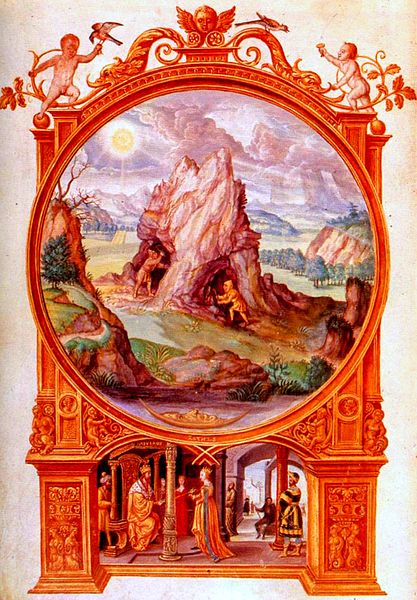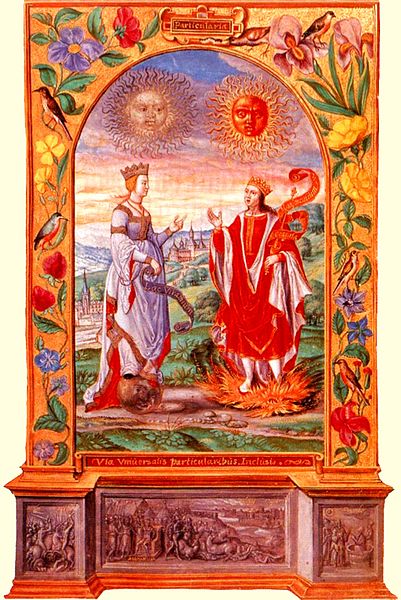
The Thammasat University Library owns two copies of a popular novel The Alchemist.
They are shelved in the Fiction Stacks of the Puey Ungphakorn Library, Rangsit campus and the Fiction Stacks of the Pridi Banomyong Library, Tha Prachan campus.
The Alchemist was written by the Brazilian author Paulo Coelho. It is an allegorical novel. An allegorical novel is one that contains an allegory.
As a literary device, an allegory is a narrative in which a character, place, or event is used to deliver a broader message about real-world issues and occurrences. Authors have used allegory throughout history in all forms of art to illustrate or convey complex ideas and concepts in ways that are comprehensible or striking to its viewers, readers, or listeners.
The TU Library owns several analyses of the literary device of allegory.
The noun allegory derives from Latin words meaning another way of speaking, which refers to the manner that a story, poem, or picture can be interpreted to reveal a hidden meaning, usually a moral or political one.
The Alchemist is about a young shepherd from Andalusia, Spain, who travels to the pyramids of Egypt after he repeatedly dreams that he will discover treasure there.
The shepherd, named Santiago, learns during his adventures. In Egypt, he meets an alchemist who helps him to understand himself and spirituality.
TU students who enjoyed reading the novel The Little Prince will probably also like The Alchemist.
Alchemy is an ancient branch of natural philosophy, a philosophical and protoscientific tradition practiced throughout Europe, Africa, and Asia. It originated in Greco-Roman Egypt in the first few centuries CE.
Alchemists tried to purify and perfect certain materials. For example, they tried to transform lead into gold by the science that was known at the time. They also tried to develop a medicine that would give patients eternal life and cure any disease.
The noun alchemy derives from Greek and Arabic terms meaning the process of changing things to join them with godly things.
Sir Isaac Newton, one of the greatest of Western scientists, was also an alchemist.

TU students of science, religion, philosophy, literature, and related subjects should find material of interest in the history of alchemy. Here are some thoughts about alchemy by authors, many of whom are represented in the TU Library collection:
- The Hindus do not pay particular attention to alchemy, but no nation is entirely free from it, and one nation has more bias for it than another, which must not be construed as proving intelligence or ignorance; for we find that many intelligent people are entirely given to alchemy, whilst ignorant people ridicule the art and its adepts.
Alberuni, quoted from Lal, K. S. (1992). The legacy of Muslim rule in India.
- Throughout his long life, Isaac Newton continued to experiment in alchemy; indeed, he was, as Gleick writes, “the peerless alchemist of Europe”. These studies in the dark art were conducted in deepest secrecy, and did not come to light until centuries after his death, when a large portion of his papers were reassembled. The economist John Maynard Keynes, the saviour of much of this documentation, was astonished by what he read. “Newton,” Keynes told his students at Trinity, “was not the first of the age of reason. He was the last of the magicians.”
John Banville, (29 August 2003) Review of Isaac Newton by James Gleick, The Guardian.
- It is a mistake to confound Alchemy with Chemistry. Modern Chemistry is a science which deals merely with the external forms in which the element of matter is manifesting itself. It never produces anything new. We may mix and compound and decompose two or more chemical bodies an unlimited number of times, and cause them to appear under various different forms, but at the end we will have no augmentation of substance, nor anything more than the combinations of the substances that have been employed at the beginning. Alchemy does not mix or compound anything, it causes that which already exists in a latent state to become active and grow. Alchemy is, therefore, more comparable to botany or agriculture than to Chemistry; and, in fact, the growth of a plant, a tree, or an animal is an alchemical process going on in the alchemical laboratory of nature, and performed by the great Alchemist, the power of God acting in nature.
Franz Hartmann
- Everyone knows Newton as the great scientist. Few remember that he spent half his life muddling with alchemy, looking for the philosopher’s stone. That was the pebble by the seashore he really wanted to find.
Fritz Leiber
- I had discovered, early in my researches, that their doctrine was no mere chemical fantasy, but a philosophy they applied to the world, to the elements, and to man himself.
William Butler Yeats
- For me, I have seen worlds and people begin and end, actually and metaphorically, and it will always be the same. It’s always fire and water. No matter what your scientific background, emotionally you’re an alchemist. You live in a world of liquids, solids, gases and heat-transfer effects that accompany their changes of state. These are the things you perceive, the things you feel. Whatever you know about their true natures is rafted on top of that. So, when it comes to the day-to-day sensations of living, from mixing a cup of coffee to flying a kite, you treat with the four ideal elements of the old philosophers: earth, air, fire, water. Let’s face it, air isn’t very glamorous, no matter how you look at it. I mean, I’d hate to be without it, but it’s invisible and so long as it behaves itself it can be taken for granted and pretty much ignored. Earth? The trouble with earth is that it endures. Solid objects tend to persist with a monotonous regularity. Not so fire and water, however. They’re formless, colorful, and they’re always doing something. While suggesting you repent, prophets very seldom predict the wrath of the gods in terms of landslides and hurricanes. No. Floods and fires are what you get for the rottenness of your ways. Primitive man was really on his way when he learned to kindle the one and had enough of the other nearby to put it out. It is coincidence that we’ve filled hells with fires and oceans with monsters? I don’t think so. Both principles are mobile, which is generally a sign of life. Both are mysterious and possess the power to hurt or kill. It is no wonder that intelligent creatures the universe over have reacted to them in a similar fashion. It is the alchemical response.
Roger Zelazny

(All images courtesy of Wikimedia Commons)
